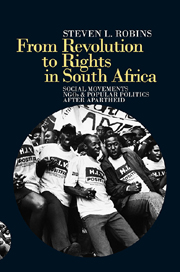 From Revolution to Rights in South Africa
From Revolution to Rights in South Africa Book contents
- Frontmatter
- Contents
- Foreword & Acknowledgements
- Abbreviations
- Zapiro cartoons
- 1 Introduction
- 2 Activist Mediations of ‘Rights’ & Indigeneous Identity
- 3 Citizens & ‘Bushmen’
- 4 ‘Civil Society’ & Popular Politics in the Postcolony
- 5 AIDS, Science & the Making of a Social Movement
- 6 Rights Passages from ‘Near Death’ to ‘New Life’
- 7 Sexual Rights & Sexual Cultures
- 8 Conclusion
- Bibliography
- Index
4 - ‘Civil Society’ & Popular Politics in the Postcolony
‘Deep Democracy’ & Deep Authoritarianism at the Tip of Africa?
Published online by Cambridge University Press: 05 April 2013
- Frontmatter
- Contents
- Foreword & Acknowledgements
- Abbreviations
- Zapiro cartoons
- 1 Introduction
- 2 Activist Mediations of ‘Rights’ & Indigeneous Identity
- 3 Citizens & ‘Bushmen’
- 4 ‘Civil Society’ & Popular Politics in the Postcolony
- 5 AIDS, Science & the Making of a Social Movement
- 6 Rights Passages from ‘Near Death’ to ‘New Life’
- 7 Sexual Rights & Sexual Cultures
- 8 Conclusion
- Bibliography
- Index
Summary
Introduction
On 17 September 2002, about two hundred people from diverse race, class and ethnic backgrounds gathered at the Centre for the Book in Cape Town's city centre to hear the internationally known housing activist, Sheela Patel, talk about the work of an alliance of Mumbai-based slum dweller's federations that are part of the global network of the Slum Dwellers International (SDI). The audience included a large group of black South African women and young people from the South African Homeless People's Federation (SAHPF), activists, members of parliament, judges, academics and ordinary citizens. This was Patel's twentieth visit to Cape Town as part of a decade-long exchange programme between housing activists and slum dwellers from India, Thailand, South Africa and eleven other developing countries. Patel spoke of her organisation's strategies for empowering the urban poor in India – of the ‘horizontal exchanges’, savings schemes, ‘toilet festivals’, self-enumeration and self-census exercises and various other ‘empowerment rituals’ deployed by these Indian women's federations. Patel concluded by noting that houses, savings, good governance and accountability were not the primary objectives of these slum dwellers’ organisations. Instead, the aim was to create South–South poor people's networks in order to fight the isolation and disempowerment produced by conditions of poverty.
- Type
- Chapter
- Information
- From Revolution to Rights in South AfricaSocial Movements, NGOs and Popular Politics After Apartheid, pp. 77 - 99Publisher: Boydell & BrewerPrint publication year: 2008


